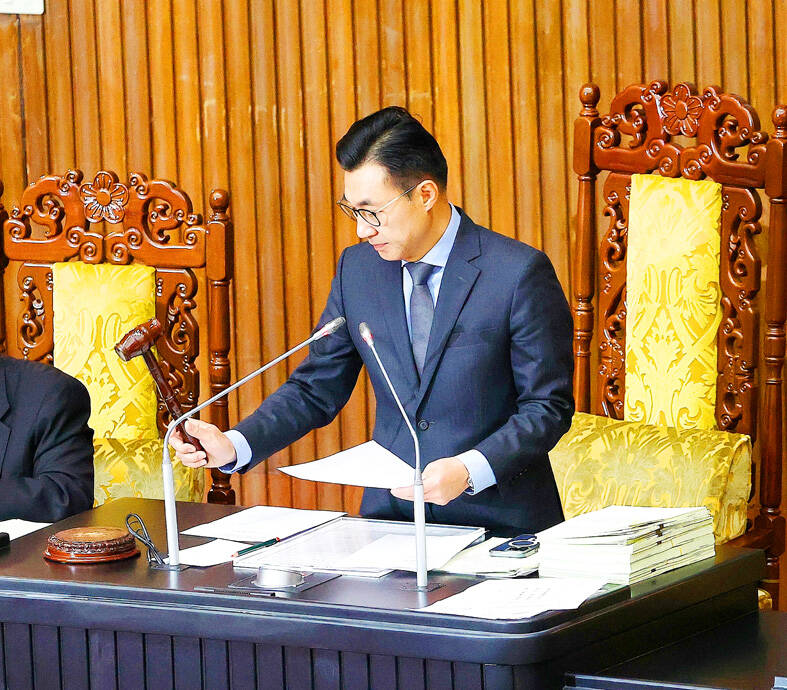Legislators across party lines yesterday passed a measure extending a reduced transaction tax on stock trades for day traders to 2027, which a trade association said would help maintain a high level of market activity.
The amendment to the Securities Transaction Tax Act (證券交易稅條例) would maintain a preferential 0.15 percent transaction tax rate for investors who buy and sell the same stocks in the same session.
The lower rate, which has been in place since April 2017, but was set to expire yesterday, is half the normal transaction tax rate of 0.3 percent, and was originally adopted to drum up trading volume on Taiwan’s stock markets.

Photo: CNA
Chinese Nationalist Party (KMT) Legislator Lai Shyh-bao (賴士葆), who introduced a proposed amendment to the act, said the lower tax on day trading was worth extending, as it has had a positive effect on stock market activity and tax revenue.
Minister of Finance Chuang Tsui-yun (莊翠雲) on Monday urged lawmakers to vote for another extension, saying that failure to do so would risk complicating revenue collection and harming market sentiment.
Financial Supervisory Commission Deputy Chairman Chen Yen-liang (陳彥良) said on Dec. 23 that without the three-year extension, stock trading volume could shrink 30 percent.
The amendment still needs to be signed by the president and promulgated before it takes effect.
Following passage of the amendment, the Taiwan Securities Association said the transaction rate tax cut would continue to benefit market activity, as day trading accounts for about one-fifth of trading volumes and about 40 percent of total market turnover in Taiwan.
The tax cut has been credited with helping to boost turnover in the country’s US$2.5 trillion stock market, the world’s 10th-largest by value.
The benchmark TAIEX closed 0.67 percent lower yesterday, paring an earlier decline of as much as 0.9 percent. The gauge gained 28.47 percent this year, the biggest annual return since 2009, Taiwan Stock Exchange data showed.
Additional reporting by Bloomberg

When an apartment comes up for rent in Germany’s big cities, hundreds of prospective tenants often queue down the street to view it, but the acute shortage of affordable housing is getting scant attention ahead of today’s snap general election. “Housing is one of the main problems for people, but nobody talks about it, nobody takes it seriously,” said Andreas Ibel, president of Build Europe, an association representing housing developers. Migration and the sluggish economy top the list of voters’ concerns, but analysts say housing policy fails to break through as returns on investment take time to register, making the

‘SILVER LINING’: Although the news caused TSMC to fall on the local market, an analyst said that as tariffs are not set to go into effect until April, there is still time for negotiations US President Donald Trump on Tuesday said that he would likely impose tariffs on semiconductor, automobile and pharmaceutical imports of about 25 percent, with an announcement coming as soon as April 2 in a move that would represent a dramatic widening of the US leader’s trade war. “I probably will tell you that on April 2, but it’ll be in the neighborhood of 25 percent,” Trump told reporters at his Mar-a-Lago club when asked about his plan for auto tariffs. Asked about similar levies on pharmaceutical drugs and semiconductors, the president said that “it’ll be 25 percent and higher, and it’ll

CHIP BOOM: Revenue for the semiconductor industry is set to reach US$1 trillion by 2032, opening up opportunities for the chip pacakging and testing company, it said ASE Technology Holding Co (日月光投控), the world’s largest provider of outsourced semiconductor assembly and test (OSAT) services, yesterday launched a new advanced manufacturing facility in Penang, Malaysia, aiming to meet growing demand for emerging technologies such as generative artificial intelligence (AI) applications. The US$300 million facility is a critical step in expanding ASE’s global footprint, offering an alternative for customers from the US, Europe, Japan, South Korea and China to assemble and test chips outside of Taiwan amid efforts to diversify supply chains. The plant, the company’s fifth in Malaysia, is part of a strategic expansion plan that would more than triple

Taiwanese artificial intelligence (AI) server makers are expected to make major investments in Texas in May after US President Donald Trump’s first 100 days in office and amid his rising tariff threats, Taiwan Electrical and Electronic Manufacturers’ Association (TEEMA, 台灣電子電機公會) chairman Richard Lee (李詩欽) said yesterday. The association led a delegation of seven AI server manufacturers to Washington, as well as the US states of California, Texas and New Mexico, to discuss land and tax issues, as Taiwanese firms speed up their production plans in the US with many of them seeing Texas as their top option for investment, Lee said. The